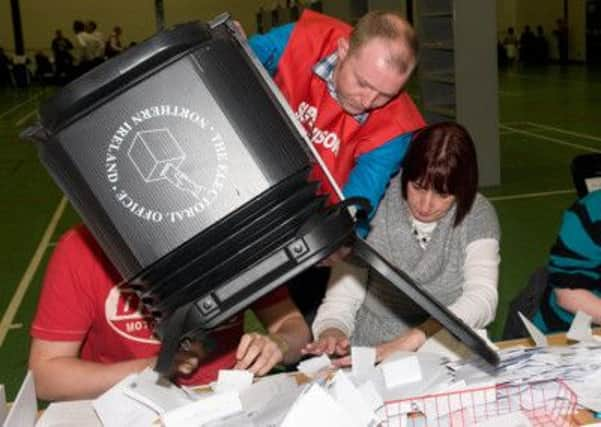New powers in voters’ hands as Londonderry goes to the polls


Local voters will also cast ballots - alongside their counterparts throughout Northern Ireland - to decide who Northern Ireland sends to Brussels and Strasbourg.
Meanwhile, in Limavady, electors will be selecting candidates for the new Causeway Coast and Glens District Council.
Advertisement
Hide AdAdvertisement
Hide AdThe new Derry City and Strabane District Council will run alongside the pre-existing Londonderry and Strabane local authorities until April 1, 2015, and will be entrusted with a range of powers including those of striking rates and naming the new body, as reported here in 2012.
In fact, the 40 councillors the Londonderry and Strabane electorate choose tomorrow (May 22) will be far more powerful than the higher profile European Election candidates who are looking for votes from voters all over Northern Ireland.
Following the initial ‘shadow’ period the Councils will adopt a full range of new functions and powers on April 1, 2015.
The candidates selected tomorrow will eventually have control over local development plan functions and development control and enforcement (planning); off street parking, with the exception of Park and Ride (roads); functions associated with physical development (e.g. environmental improvement schemes), area based regeneration (such as Neighbourhood Renewal), and some community development programmes for the voluntary and community sectors (urban regeneration).
Advertisement
Hide AdAdvertisement
Hide AdWith regard to the latter the Department of Social Development (DSD) Minister Nelson McCausland has already confirmed it will be up to the new Council to decide whether or not to build and fund a new ‘Factory Girls’ sculpture at Harbour Square.
Councillors will also have control over the registration of houses in multiple occupation, housing unfitness responsibilities, including repair and demolition notices (housing); Start a Business Programme and Enterprise Shows, Youth Entrepreneurship (such as Prince’s Trust and Shell Livewire), Social Entrepreneurship, Investing for Women, Neighbourhood Renewal funding relating to enterprises initiatives (local economic development functions transferred from Invest NI); and small scale tourism accommodation development, providing business support including business start up advice along with training and delivery of customer care schemes, and providing advice to developers on tourism policies and related issues (local tourism).
Some elements of the delivery of the EU Rural Development Programme will be transferred and the new council will be able to add buildings to the statutory list on a
temporary basis, subject to ratification by the DOE.
It will have the authority to draw up local lists of buildings that are of architectural and/or historic interest and control over local water recreational facilities.
Advertisement
Hide AdAdvertisement
Hide AdBy contrast, Members of the European Parliament have relatively little power.
The Parliament was established in 1979, in what looks suspiciously like an afterthought, over twelve years after the European Commission and European Council were created.
Today it has limited powers and takes a back seat as far as proposing or initiating legislation is concerned.
Real power in Europe lies with the Commission, which is unelected and appointed through bargaining between member states.
Advertisement
Hide AdAdvertisement
Hide AdThe Parliament isn’t allowed to initiate legislation under current rules.
For example, under Article 289 of the Treaty on the Functioning of the European Union (TFEU), consultation is a special legislative procedure, whereby Parliament is asked for its opinion on proposed legislation before the Council of the European Union adopts it.
However, although the European Parliament may approve or reject a legislative proposal, or propose amendments to it, the Council is not legally obliged to take account of Parliament’s opinion but in line with the case-law of the Court of Justice, it must not take a decision without having received it.